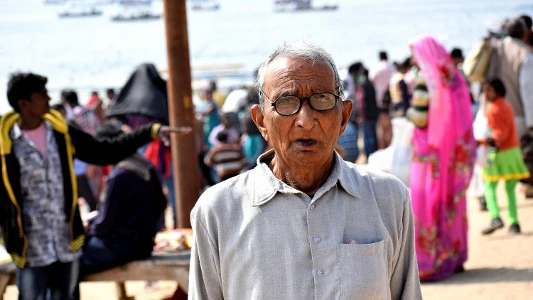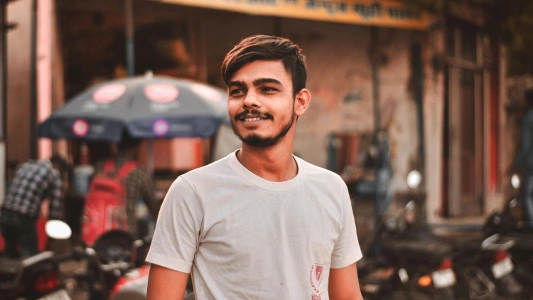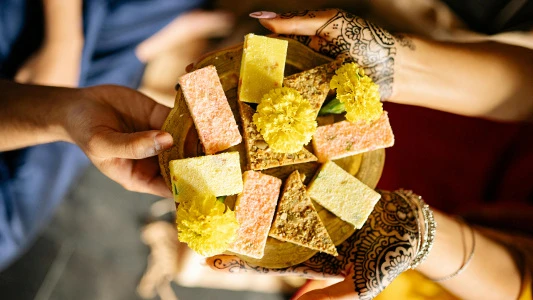Managing diabetes in my multi-diabetic Kolkata home

Diabetes isn’t just my disease – My parents and I all have type 2 diabetes, and it’s part of the daily rhythm of my family.
In our family’s Kolkata apartment, diabetes decides our meals, our timings, and even our arguments.
Because it’s one thing to take care of your own body. But when the people you love are struggling with the same disease, it becomes something else entirely – A perpetual juggling act between caregiving and self-care.
A kitchen divided by food, tradition and compromise
In an Indian kitchen, food is love. It’s the way we care, celebrate and come together.
But diabetes turns that love into a battlefield.
My dad is 69, and he’s a simple eater – Most days, his diet consists of dal, rice, and perhaps some fish.
My mom is 67, and she’s the opposite – She has a natural sweet tooth, seeking out the roshogollas and sondesh that feel every shelf of Kolkata’s markets.
I’m in between, struggling with portion control and the emotional draw of comfort food.
And our first battleground together was rice. Rice has been our family’s staple food for generations, but after the diabetes diagnosis, rice became our enemy. Brown rice is a good substitute for white rice, but logic doesn’t always win when you live in an Indian home.
“Eta kono bhaat holo?” (Is this even rice?) my father complained when I first brought it out.
And my mother joined in, “Pethe bhalo lagena!” (It doesn’t agree with my stomach!)
I sympathised with them – Brown rice was gritty and alien, not soft and comforting like white rice.
But we couldn’t give up completely, so I started mixing a little white rice with the brown. Sometimes we replace the rice with whole wheat rotis. And some days, I cook dalia (broken wheat) and sneak in vegetables to give it substance.
It isn’t perfect, and we have issues, but we’ve adjusted. Because what else could we do?
The emotional weight of caregiving and self-care
It’s exhausting being both a caregiver and a diabetic myself. And I often fall short.
- I remind my parents to take their medicine but forget my own.
- I carefully portion their meals but binge on snacks when I’m distressed.
- I berate them to check their blood sugar levels but avoid getting my own tested.
One evening, after a long day at the office, I was sitting at the dinner table (gazing at a plate of roti and sabzi) when my mother walked in with a mishti held tight in her fist.
“Just one?” she asked, desire gleaming in her eyes.
I wanted to say no and remind her of her unstable sugar levels. But I noticed something in her expression – An unspoken plea, a cry for just one moment of normalcy.
So I sighed and cracked open the mishti. “Half-half,” I told her.
She smiled and accepted her share like it was our own special secret.
Later, I did feel guilty about eating it myself. But I also learned something that day – Diabetes is a never-ending battle, and sometimes, you simply have to go easy on yourself.
The social pressures of diabetes in Kolkata
In Kolkata, diabetes isn’t contained within the home. In a culture where food is at the centre of every social occasion, diabetes makes its presence felt outside as well.
At weddings, family gatherings, or even just casual chai addas, there’s always someone pushing – “Arektu kheye dekh!” (Just taste a little!) and “Aare, ekdin kheley ki hobe?” (What will happen if you eat it for just one day?)
Explaining diabetes to relatives is exhausting.
If I refuse sweets, I get pitied – “Oh, so you can never have sweets anymore?”
And if I have a spoonful, I get talked down to – “See! I told you, one bit won’t hurt you.”
However, I know it’s worse for my parents. They belong to a generation where limiting eating was rare, and good health was measured by the amount eaten (not the blood sugar number). When my mother goes to visit relatives, she returns home and guiltily confesses, “Ektu kheye fellam,” (I ate a little).
I don’t scold her. Because I know how tough it can be, and I’m waging the same battles.
What our multi-diabetic home has taught me
Despite the challenges of living in a multi-diabetic home, I have picked up a few invaluable lessons.
- Modification is better than prohibition – You’ll have more success modifying foods rather than banning them. My mom now enjoys homemade stevia-mishti. And my dad has come to accept dalia as an occasional rice alternative.
- Habit is the solution – Establishing regular meal times and a nightly walk routine will increase your chances of success. Some days, my dad resists the walk. But when I remind him we’re all in it together, he nods and puts on his slippers.
- Care is the greatest cure – When I get too stressed my mom makes me take a deep breath. If my dad is too tired, I walk with him hand-in-hand. And if one of us ever makes a mistake, we don’t scold them. That’s how we can keep moving forward.
- Diabetes isn’t numbers and lines of diet chart – It’s strength. And learning ways to live without enslaving yourself to the disease.
In my Kolkata home, we’re still figuring things out. One meal, one conversation, and one small victory at a time.
And maybe in that struggle, we’re doing something right.
Looking for more stories like this?
Lisa is the primary caregiver for her type 2 diabetic father. In the beginning, she used to think that’s all she was. But now she’s realised she’s so much more.
Rishi was 16 when he was diagnosed with type 2 diabetes. Filled with shame, he tried to hide from the world. Then he embraced it, and grew strong again.
As a type 2 diabetic, Nirvaanika has struggled to manage her health in the face of festivals and the sweets that come with them. But she's found a balance.








